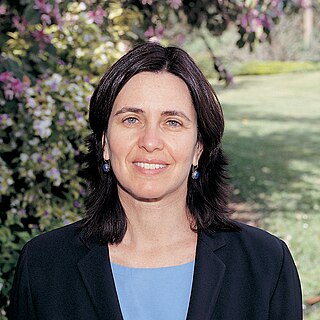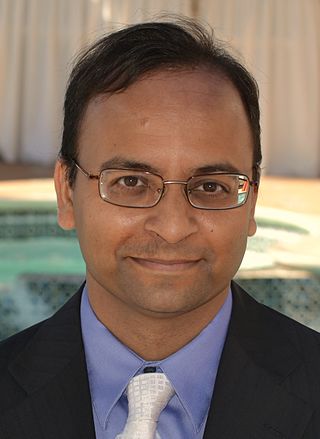Related Research Articles

Ronald Linn Rivest is a cryptographer and computer scientist whose work has spanned the fields of algorithms and combinatorics, cryptography, machine learning, and election integrity. He is an Institute Professor at the Massachusetts Institute of Technology (MIT), and a member of MIT's Department of Electrical Engineering and Computer Science and its Computer Science and Artificial Intelligence Laboratory.

Manuel Blum is a Venezuelan born American computer scientist who received the Turing Award in 1995 "In recognition of his contributions to the foundations of computational complexity theory and its application to cryptography and program checking".

David Bryant Mumford is an American mathematician known for his work in algebraic geometry and then for research into vision and pattern theory. He won the Fields Medal and was a MacArthur Fellow. In 2010 he was awarded the National Medal of Science. He is currently a University Professor Emeritus in the Division of Applied Mathematics at Brown University.

Shafrira Goldwasser is an Israeli-American computer scientist and winner of the Turing Award in 2012. She is the RSA Professor of Electrical Engineering and Computer Science at Massachusetts Institute of Technology; a professor of mathematical sciences at the Weizmann Institute of Science, Israel; the director of the Simons Institute for the Theory of Computing at the University of California, Berkeley; and co-founder and chief scientist of Duality Technologies.

Lenore Carol Blum is an American computer scientist and mathematician who has made contributions to the theories of real number computation, cryptography, and pseudorandom number generation. She was a distinguished career professor of computer science at Carnegie Mellon University until 2019 and is currently a professor in residence at the University of California, Berkeley. She is also known for her efforts to increase diversity in mathematics and computer science.

Robin James Wilson is an English mathematician. He is an emeritus professor in the Department of Mathematics at the Open University, having previously been Head of the Pure Mathematics Department and Dean of the Faculty. He was a stipendiary lecturer at Pembroke College, Oxford and, as of 2006, Gresham Professor of Geometry at Gresham College, London, where he has also been a visiting professor. On occasion, he teaches at Colorado College in the United States. He is also a long standing fellow of Keble College, Oxford.

David Arthur Eppstein is an American computer scientist and mathematician. He is a distinguished professor of computer science at the University of California, Irvine. He is known for his work in computational geometry, graph algorithms, and recreational mathematics. In 2011, he was named an ACM Fellow.

Karl Cooper Rubin is an American mathematician at University of California, Irvine as Thorp Professor of Mathematics. Between 1997 and 2006, he was a professor at Stanford, and before that worked at Ohio State University between 1987 and 1999. His research interest is in elliptic curves. He was the first mathematician (1986) to show that some elliptic curves over the rationals have finite Tate–Shafarevich groups. It is widely believed that these groups are always finite.
Etta Zuber Falconer was an American educator and mathematician the bulk of whose career was spent at Spelman College, where she eventually served as department head and associate provost. She was one of the earlier African-American women to receive a Ph.D. in mathematics.

Chuu-Lian Terng is a Taiwanese-American mathematician. Her research areas are differential geometry and integrable systems, with particular interests in completely integrable Hamiltonian partial differential equations and their relations to differential geometry, the geometry and topology of submanifolds in symmetric spaces, and the geometry of isometric actions.
CEILIDH is a public key cryptosystem based on the discrete logarithm problem in algebraic torus. This idea was first introduced by Alice Silverberg and Karl Rubin in 2003; Silverberg named CEILIDH after her cat. The main advantage of the system is the reduced size of the keys for the same security over basic schemes.

Cynthia Dwork is an American computer scientist best known for her contributions to cryptography, distributed computing, and algorithmic fairness. She is one of the inventors of differential privacy and proof-of-work.
Ernst Sejersted Selmer was a Norwegian mathematician, who worked in number theory, as well as a cryptologist. The Selmer group of an Abelian variety is named after him. His primary contributions to mathematics reside within the field of diophantine equations. He started working as a cryptologist during the Second World War; due to his work, Norway became a NATO superpower in the field of encryption.

Kristin Estella Lauter is an American mathematician and cryptographer whose research interest is broadly in application of number theory and algebraic geometry in cryptography. She is particularly known for her work in the area of elliptic curve cryptography. She was a researcher at Microsoft Research in Redmond, Washington, from 1999–2021 and the head of the Cryptography Group from 2008–2021; her group developed Microsoft SEAL. In April 2021, Lauter joined Facebook AI Research (FAIR) as the West Coast Head of Research Science. She became the President-Elect of the Association for Women in Mathematics in February 2014 and served as President February 1, 2015 - January 31, 2017.

Tal Rabin is a computer scientist and Professor of Computer and Information Science at the University of Pennsylvania. She was previously the head of research at the Algorand Foundation and the head of the cryptography research group at IBM's Thomas J. Watson Research Center.

Amit Sahai is an Indian-American computer scientist. He is a professor of computer science at UCLA and the director of the Center for Encrypted Functionalities.
Lawrence Clinton Washington is an American mathematician at the University of Maryland who specializes in number theory.

Peter Landrock is a Danish cryptographer and mathematician. He is known for his contributions to data encryption methods and codes. Landrock has been active since the 1970s as research scientist and faculty member for Cambridge University and the University of Aarhus and others, and was active for Microsoft and Cryptomathic. He has been visiting professor at Oxford University, Leuven University and Princeton University.
Lynne Marie Butler is an American mathematician whose research interests include algebraic combinatorics, group theory, and mathematical statistics. She is a professor of mathematics at Haverford College.

Andrew Victor Sutherland is an American mathematician and Principal Research Scientist at the Massachusetts Institute of Technology. His research focuses on computational aspects of number theory and arithmetic geometry. He is known for his contributions to several projects involving large scale computations, including the Polymath project on bounded gaps between primes, the L-functions and Modular Forms Database, the sums of three cubes project, and the computation and classification of Sato-Tate distributions.
References
- ↑ Birth year from ISNI authority control file, retrieved 2 December 2018.
- 1 2 3 4 5 6 7 8 Curriculum Vitae, University of California, Irvine, retrieved 18 January 2020.
- ↑ Rubin, Karl; Silverberg, Alice (2003), "Torus-based cryptography", Advances in Cryptology - CRYPTO 2003, Lecture Notes in Computer Science, vol. 2729, Springer, pp. 349–365, doi: 10.1007/978-3-540-45146-4_21 .
- ↑ Silverberg, Alice (1992), "Fields of definition for homomorphisms of abelian varieties", Journal of Pure and Applied Algebra , 77 (3): 253–262, doi: 10.1016/0022-4049(92)90141-2 , MR 1154704 .
- ↑ Silverberg, Alice (1988), "Torsion points on abelian varieties of CM-type", Compositio Mathematica , 68 (3): 241–249, MR 0971328, Zbl 0683.14002 .
- ↑ Alice Silverberg at the Mathematics Genealogy Project
- ↑ Board of directors, Number Theory Foundation , retrieved 20 January 2020
- ↑ List of Fellows of the American Mathematical Society
- ↑ AWM Fellows: 2019 Class of Fellows, Association for Women in Mathematics , retrieved 26 January 2019
- ↑ "Alice's Adventures in Numberland" . Retrieved 18 January 2020.
- ↑ "Interview with Alice Silverberg". Mathematical Association of America. Retrieved 10 October 2017.
- ↑ Fine, Cordelia (2005). Delusions of gender: The real science behind sex differences. Icon Books Ltd.